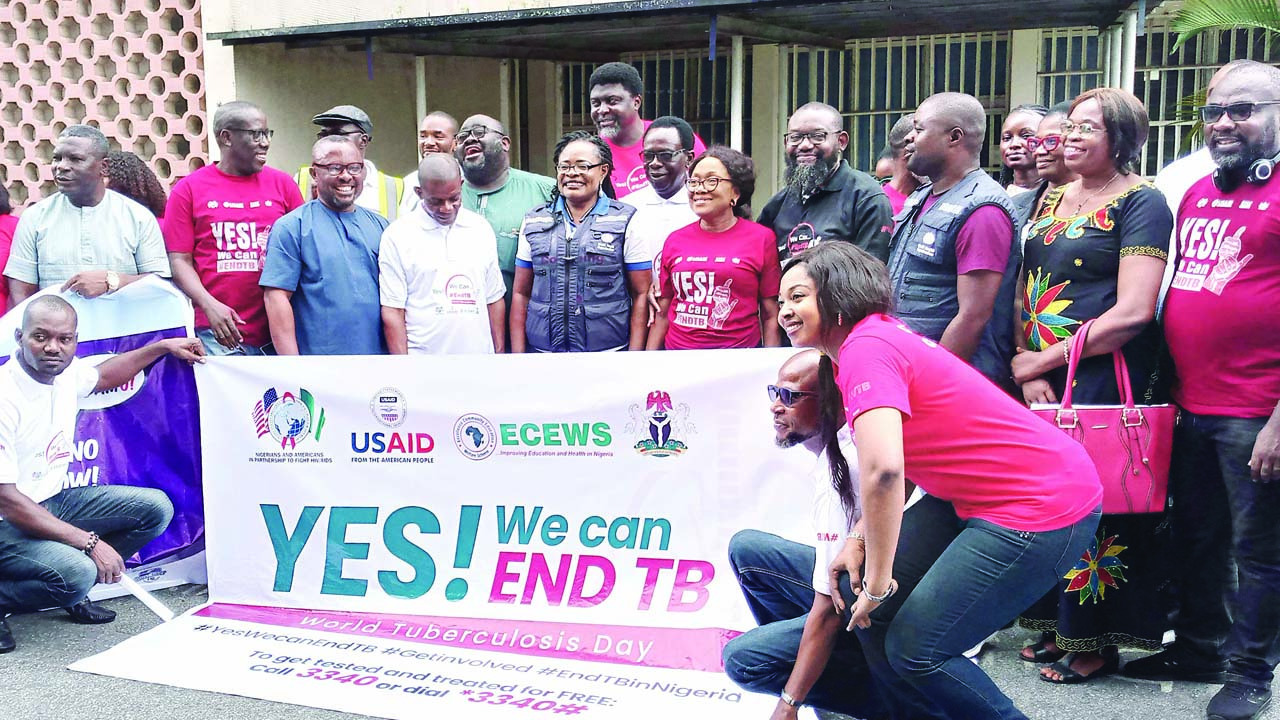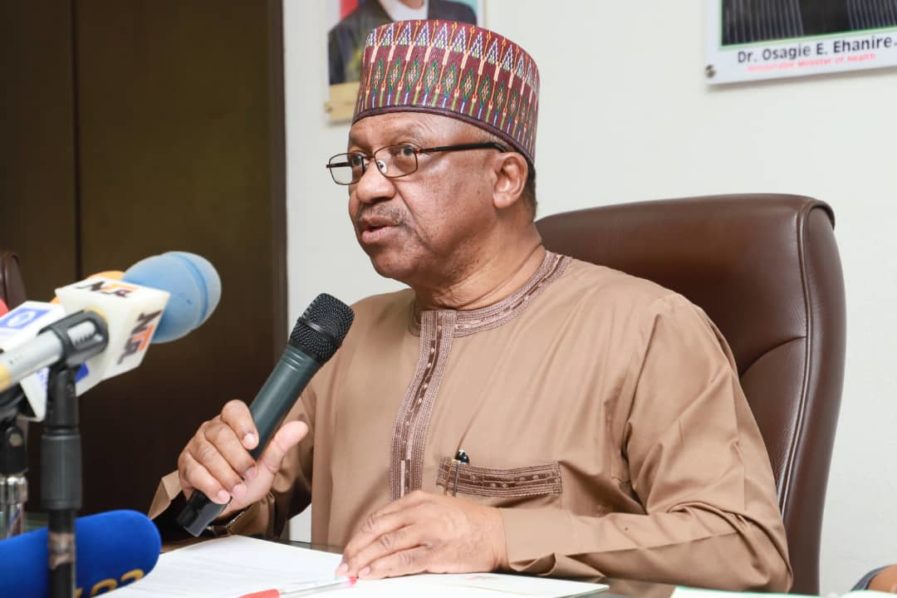
• USAID Spends $250m
• Cross River Laments Poor Case Notification
The United States Agency for International Development (USAID) has contributed more than $250 million to TB control efforts in Nigeria since 2003.
The agency noted that in 2022 alone, USAID programmes helped screen over 15 million individuals for TB and also supports the provision of TB screening, diagnostic, treatment and preventive services in 18 states through community and facility-based interventions.
Deputy Director, Office of HIV/ AIDS and TB USAID Nigeria, Omosalewa Oyelaran, who stated this during a briefing to mark 2023 World Tuberculosis Day yesterday in Abuja, observed that since 2003, Nigeria remains in the top 10 countries affected by TB, with one of the lowest detection rates globally.
She stated that to combat the debilitating disease, USAID collaborates with the Federal Government and other national and international partners to support the National Tuberculosis Programme.
She added: “In partnership with the Government of Nigeria, USAID’s ‘TB Accelerator’ model invested in local Civil Society Organisations (CSOs) to increase access to quality TB prevention, diagnosis and treatment, including multi-drug resistant TB. These local CSOs collaborate with the national and state TB programmes to deploy and scale state-of-the-art equipment and tools to improve detection of TB. USAID also facilitates multi-sectoral public-private partnerships to increase public awareness and advocate for domestic resources to address the TB epidemic in Nigeria. As a result, Nigeria realised a significant increase in TB case finding and treatment coverage over the past three years.
“Despite the additional challenges posed by the COVID-19 pandemic, we have achieved significant results working together in partnership with GON and Global Fund. We commend the Government of Nigeria’s efforts to sustain the accelerated service delivery that resulted in yearly case notification increases of 160 per cent between 2019 and 2022.
“However, much remains to be done if Nigeria is to meet its TB control target of ending the TB epidemic by 2035. We must continue to work together to reach all TB patients and their contacts in Nigeria.
“However, the greatest challenge is the funding gap, which is estimated to be 70 per cent of the resources needed to effectively control TB. Therefore, I call on you to mobilise domestic resources to meet this funding gap through budgetary allocations, inclusion of TB services in health insurance schemes and enhanced private sector engagement.”

Also speaking, the Minister of Health, Dr. Osagie Ehanire, lamented that only one in every four Nigerians knows about the disease.
Represented by the Minister of State for Health, Ekumankama Joseph Nkama, the minister, while quoting the WHO global TB report, said it was unfortunate that despite free testing and medication, Nigeria still ranked highest among countries with child TB in the world.
He added that the country is one of the countries in the world with a great burden on TB and resistance to TB medications, emphasising the need for people coughing for more than two weeks to ensure they get tested.
“TB is a curable disease. The world TB day is a global event, the event enables us to assess the progress made so far. TB is a major public health problem globally, likewise in Nigeria.
“According to WHO global TB report, Nigeria is ranked sixth in the world and first in Africa. It was revealed that there are 467,000 TB cases in Nigeria in 2021.
“Furthermore, it is only one out of every four Nigerians that have knowledge about TB. The Federal Government is committed to ensuring the end of TB in Nigeria. All the interventions of the Federal Government are yielding positive results. We have been able to expand the TB facilities from 2,038 in 2014 to over 20,000.
“I, therefore, encourage Nigerians to be their brother’s keepers. Ensure that everyone around you with cough for more than two weeks gets tested and treated,” the minister said.
In his remarks, WHO Country Representative (WR), Dr. Walter Kazadi Mulombo, who was represented by Dr Laxmikant Chavan, WHO Technical Officer, recalled that Nigeria at the United Nations High-Level meeting (UNHLM) on TB in 2018 made a commitment to diagnose and treat 1,109,000 TB cases and place 2,183,890 clients on TB preventive Therapy (TPT) from 2018 to 2022.
He, however, said that at the end of 2022, Nigeria was yet to demonstrate achievements of this commitment as reports show that the country was trailing behind in all the set targets.
Mulombo noted that TB control budgets in Nigeria continue to be drastically underfunded.
“About 69 per cent of the TB budget in 2021 was unfunded. This is a major threat to the country’s efforts in achieving the set targets. Too many people are pushed into poverty when they contract TB due to lost income, transport costs and other expenses,” Mulombo said.
On her goodwill message, the Ag. Board Chair, Stop TB Partnership Nigeria, Dr. Queen Ogbuji, said out of the annual estimate of 479,000 TB cases in Nigeria, only 285,561 were notified.
“This is good progress in the right direction, and considering the fact that Nigeria was able to increase its notification even when the world was grappling with COVID-19 and many countries of the world had low case notification and more TB deaths.
“The increase has been consistent since then and Nigeria needs to be applauded for this. However, a lot needs to be done to close the gap. While we commemorate, let it remain top in our minds the picture that Nigeria ranks first in Africa and sixth in the world accounting for about 4.6 per cent of the global TB burden,” Ogbuji said.
Also commemorating the day, President of the Nigerian Thoracic Society, Prof. Udegbunam Ele, stated that in spite of the economic realities in the country, the message remains a message of hope of “Yes! We can end TB!”
In a statement, Ele said: “We want to thank the Nigerian government through the National TB programme, local organisations as well as international agencies that have been working tirelessly to create awareness, identify and treat this most deadly and yet very treatable condition.”
He appreciated the efforts being made by government and various donor agencies toward the control and eventual eradication of the scourge.
He added: “Every year, the Nigerian Thoracic Society joins other local as well as international organizations to commemorate World Tuberculosis (TB) Day on March 24. This date marks the day in the year 1882 when Dr Robert Koch, German physician and microbiologist, announced that he had discovered the organism that causes TB.
“This discovery opened the way for the diagnosis and treatment of the disease. This day is set aside to raise public awareness about the devastating health, social and economic consequences of TB, and to step up efforts to end the global TB epidemic.
“TB remains the world’s deadliest infectious killer after COVID-19. Globally about 1.6 million deaths occurred from TB alone as at end of 2021. Eight countries contributed more than two thirds of the global mortality, namely, India, Indonesia, China, the Philippines, Pakistan, Nigeria, Bangladesh and the Democratic Republic of Congo.
“Each year over 240,000 deaths occur from TB and close to 600,000 people fall ill with this preventable and curable disease in our country. Global efforts to combat TB have saved 66 million lives globally since the year 2000 and many of those are Nigerians! This is a compelling reason why Nigeria should be in the forefront of global efforts to eradicate the disease.
“The theme of World TB Day 2023, “Yes! We can end TB” is designed to motivate stake-holders at all levels to show high-level leadership, increase investments, embrace new WHO recommendations, adopt innovations and engage in multi-sectorial collaboration in order to combat the TB scourge.
“This year’s event will focus on encouraging countries, including Nigeria, to scale up efforts in their TB control programmes as a prelude to the 2023 United Nations High-level meeting which promises to provide opportunities for securing political commitment from world leaders. There is no doubt that many nations are battling with several competing demands on their lean and diminishing resources particularly in the low and middle-income countries which unfortunately bear the greater burden of disease. The theme for this year is intended to inspire hope and encourage more action.”
On his part, the Cross River State Director of Public Health, Mr. Jonah Offor, disclosed that the state was having a shortfall of about 4000 tuberculosis cases out of the 8,000 cases expected to be notified.
He disclosed this yesterday during the sensitisation and campaign exercise to mark the 2023 World Tuberculosis Day organised by Breakthrough Action with support from USAID and other partners at the Ministry of Health premises in Calabar.
Expressing worry that the number was far less than what was expected to be notified, Offor said only an average of 5000 cases approximately was notified yearly.
He noted that this indicated that the state had a lot of missing cases of TB, which mostly were found in the rural areas.
Giving a breakdown to The Guardian shortly after the event, Offor explained: “Globally, about 1.6 million people die of tuberculosis. This is applicable to Nigeria and Cross River State. The prevalence of tuberculosis is 219 per 100,000 people. This prevalence is applicable to the whole country.
“In Cross River State, we notify between 1200 to 1500 cases of tuberculosis every quarter. So in a year, we make an average of 4500 to about 5000. This is far less from the number we are expected to be notified every year.
“We are expected to be notifying about 8000 cases every year but in the situation that we are notifying 4500 or 5000 every year that means we have a shortfall of approximately 3500 or 4000, which means that we have a lot of missing TB cases and most of this missing cases are found in our rural communities.”



